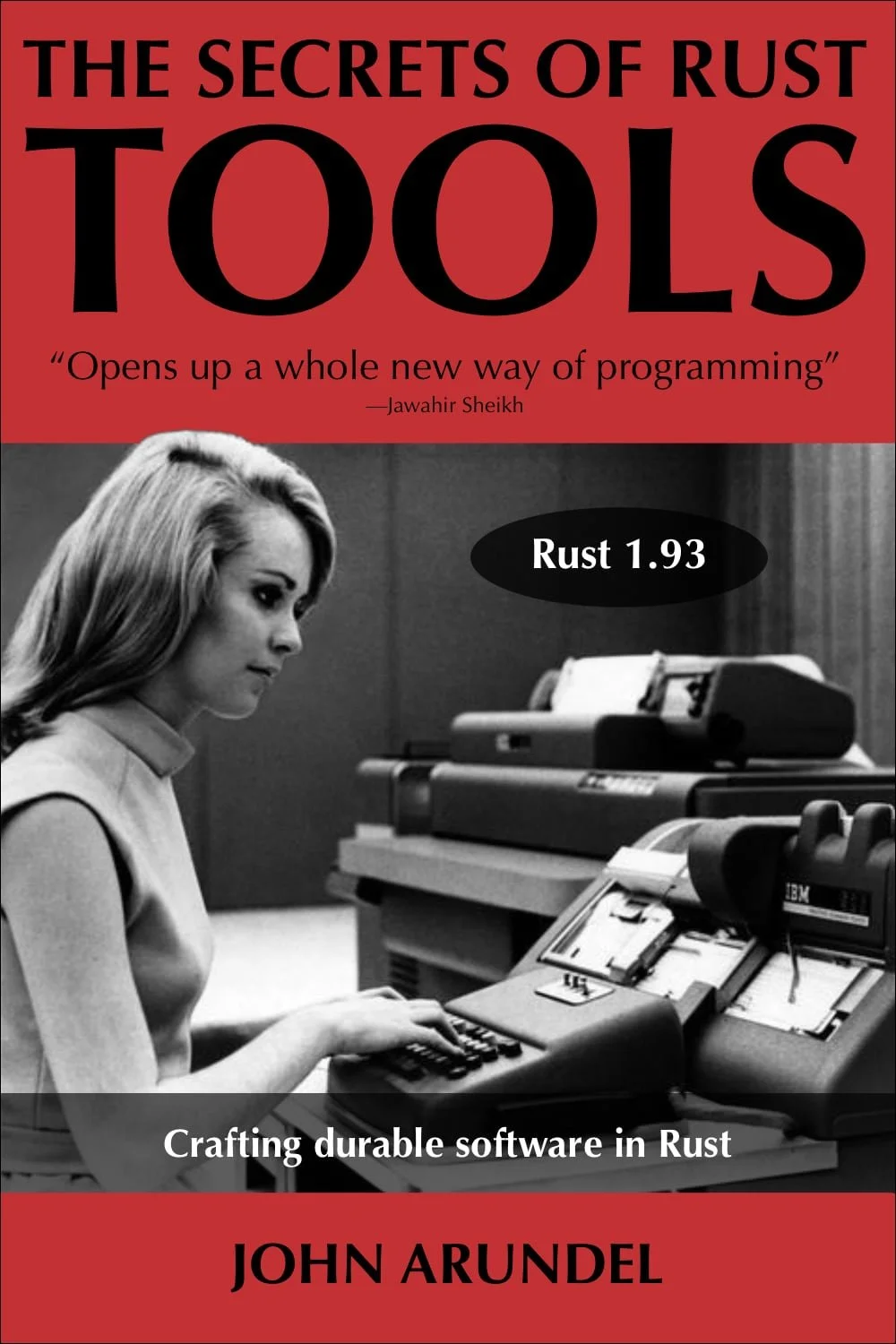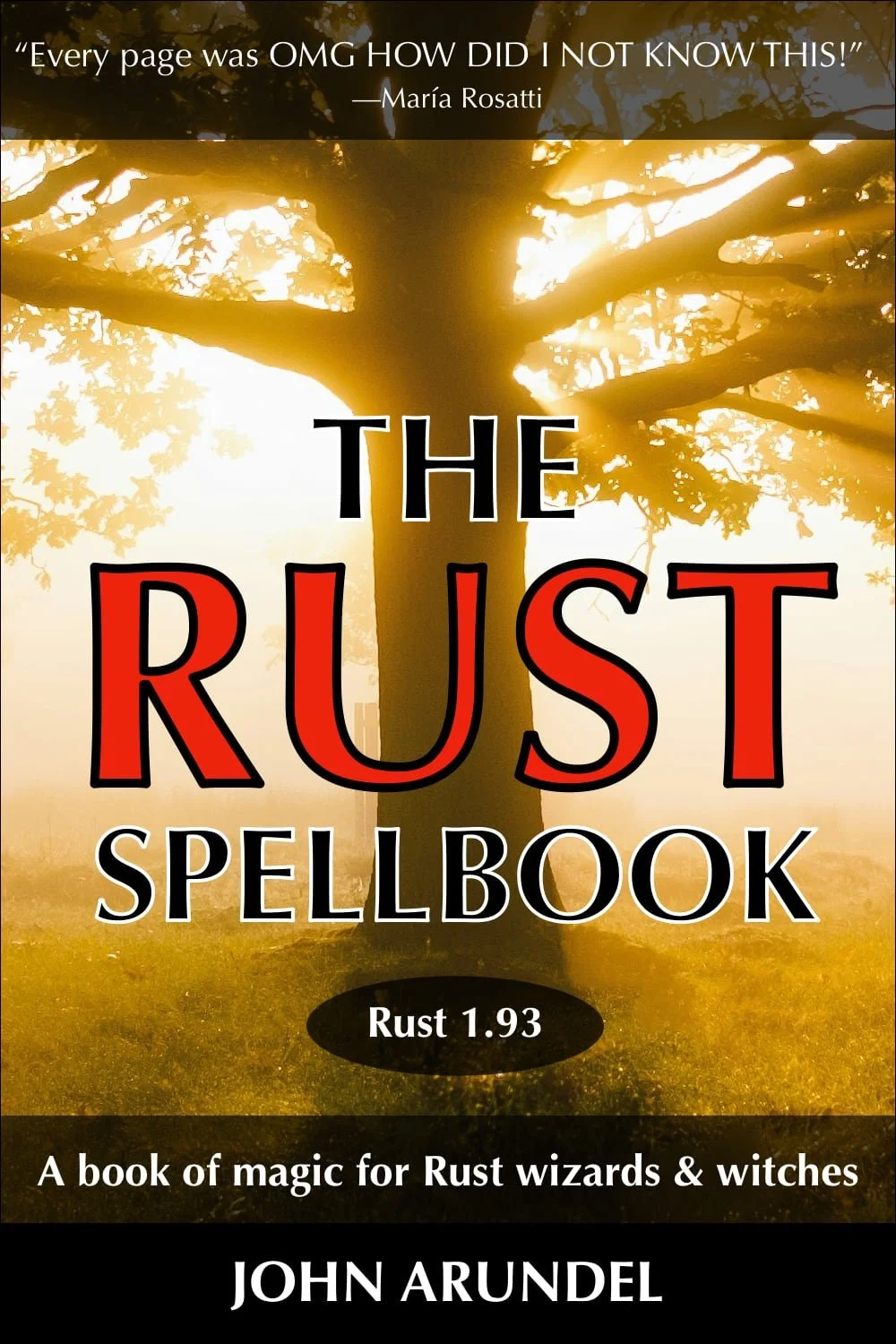The Secrets of Rust: Tools
The Secrets of Rust: Tools
Master the world’s favourite programming language with my friendly guide to building durable Rust software.
About the book
If you want to learn why Rust consistently tops polls of the most admired languages, and why its popularity is rising fast among those who want to build safe, reliable, and high-performance software, this is the book for you. You'll master a guided-by-tests workflow for designing user-friendly APIs and building libraries of trusted, stable, high-quality software components suitable for critical applications.
This friendly, supportive, yet challenging book will show you how master software engineers think, and guide you through the process of designing production-ready command-line tools in Rust, step by step. Includes free updates for life.
This book is aimed at those who have a little experience with Rust (or even a lot), and would now like to learn how to build good software with it. What is “good” software anyway? What would it look like in Rust? And how do we get there from here?
Here’s why that matters:
Rust is now being used increasingly in critical software, and what I mean by that is high stakes: life and livelihood on the line. It could be life-saving medical equipment, it could be lynchpin financial services, urgent countermeasures in war zones, low-margin control systems like nuclear reactors, space shuttles, or even cars.
This is where we want Rust to be, because we think Rust has unique properties that make it the right tool for doing this successfully.
—Jon Gjengset
You can play the book on three difficulty levels:
Easy: just follow along as we develop the solutions to each challenge; they’re explained line by line and step by step, so even if you have practically no Rust experience, you should still be able to follow everything just fine.
Medium: you can attempt each challenge yourself, but get hints and guidance on the right way to solve the problem, before reading on to see the suggested solution.
Hard: tackle the challenges without reading the hints, and use your own initiative to figure out what to do. You can still look at the hints if you get stuck, but the more you can do on your own, the more it’ll build your confidence as a Rust programmer.
Who the book is for
While it’s beginner-friendly, this book is not intended for complete beginners to Rust. It assumes that you’ve read at least the first few chapters of The Rust Programming Language, and are aware of the basic language concepts, if not yet fully familiar with them. The Secrets of Rust: Tools will show you how to put these ideas into practice in real-world programs that do useful things. Along the way, it’ll deepen and reinforce your understanding of how the Rust language works.
What you’ll learn
By reading through this book and completing the exercises, you'll learn:
How to build reusable crates instead of one-off programs
How to design user-friendly APIs, without annoying paperwork
How to write robust, testable tools that take command-line flags and arguments
How to detect, manage, and present run-time errors
How to design Rust crates that work with files and other kinds of binary data
How to encode and decode data in binary format, and translate Rust data to and from JSON
How to create robust, reusable client packages for HTTP services and other APIs
How to launch external commands and capture their output, how to parse arguments and subcommands, and how to add new features to the Cargo tool
How to write useful, informative, and high-quality automated unit tests and integration tests
If you like the book’s approach, you might be interested in studying with me directly, through my professional mentoring program, or booking some live Rust training for your team.
Excerpts
The magic function: designing clean APIs
Writing terrible code in Rust… makes great tests
Things fall apart: handling errors
For your eyes only: user-friendly errors
Here comes the sun: building a weather client
Elephants for breakfast: testing the untestable
A hard rain's a-gonna fall: parsing JSON
That mockingbird won't sing: a mock API server
What you get
Your digital download is a ZIP file containing the book in PDF and ePub formats. These should be suitable for any ebook reader, Kindle, computer, phone, or tablet.
Updating to the latest edition
All my books come with free updates for life, so if you’ve bought a previous version of this book, here’s what you need to do to get the latest edition. Click the link in your original download email (make sure you save this, as it’s your key to future updates). You’ll see what looks like an error page saying your download link for the old edition has expired, but that’s okay: click the link in the text, and you’ll be sent a new download email for the current edition.
More resources
See also my Rust training and team training sessions, books, and tutorials—and please subscribe to my free newsletter for lots more!
Readers say
Roberto Porcar, System Engineer, Data In Fact
“A valuable resource… this book stands out.”
Among the more than 20 Rust books I've purchased, this one stands out. It was a refreshing read that reminded me of the enthusiasm I felt when I first started learning Rust. I'd suggest reading it alongside the official Rust book if you are completely new to the language.
The book is packed with practical examples and it provides guidance on writing clean, efficient, reusable code. It focuses on good design principles and robust coding practices. The examples are practical and engaging, showcasing best practices for efficient coding. The author also shows how to refactor and test each project sample, and I appreciate the topics he chose and how they are broken down for better understanding. It's a valuable resource for anyone looking to learn Rust properly.
Nick Chandler, Senior Engineer, HashiCorp
“I really enjoy the project-based style.”
It helps to clarify how Rust's features come together into real programs. The book does a great job helping to connect the dots between the language concepts and how to actually build real code.
Sagar Suri, Senior Software Engineer, Netflix
“Thank you for this great book!”
I have never come across a programming book that is so simple and fun to read. I really enjoyed it.
Jakub Jarosz, Senior Software Engineer, Nginx
“Made my first steps in Rust very easy.”
The conversational style and detailed explanations really help. Thoroughly recommended!
More reviews
⭐⭐⭐⭐⭐ “I loved this book! It really gave me more confidence in using Rust.”
—Michael A
⭐⭐⭐⭐⭐ “I've tried to learn Rust before, but bounced off it somehow. This book unlocked something for me, and now I have a better understanding of just what makes Rust so different.”
—Lawrence Denning
⭐⭐⭐⭐⭐ “I can't praise this book enough. It's opened my eyes to a whole new way of programming.”
—Jawahir Sheikh
⭐⭐⭐⭐⭐ “Gentle, funny, and full of clear explanations—one of the best introductory Rust books I've read.”
—Flavio Balioni










